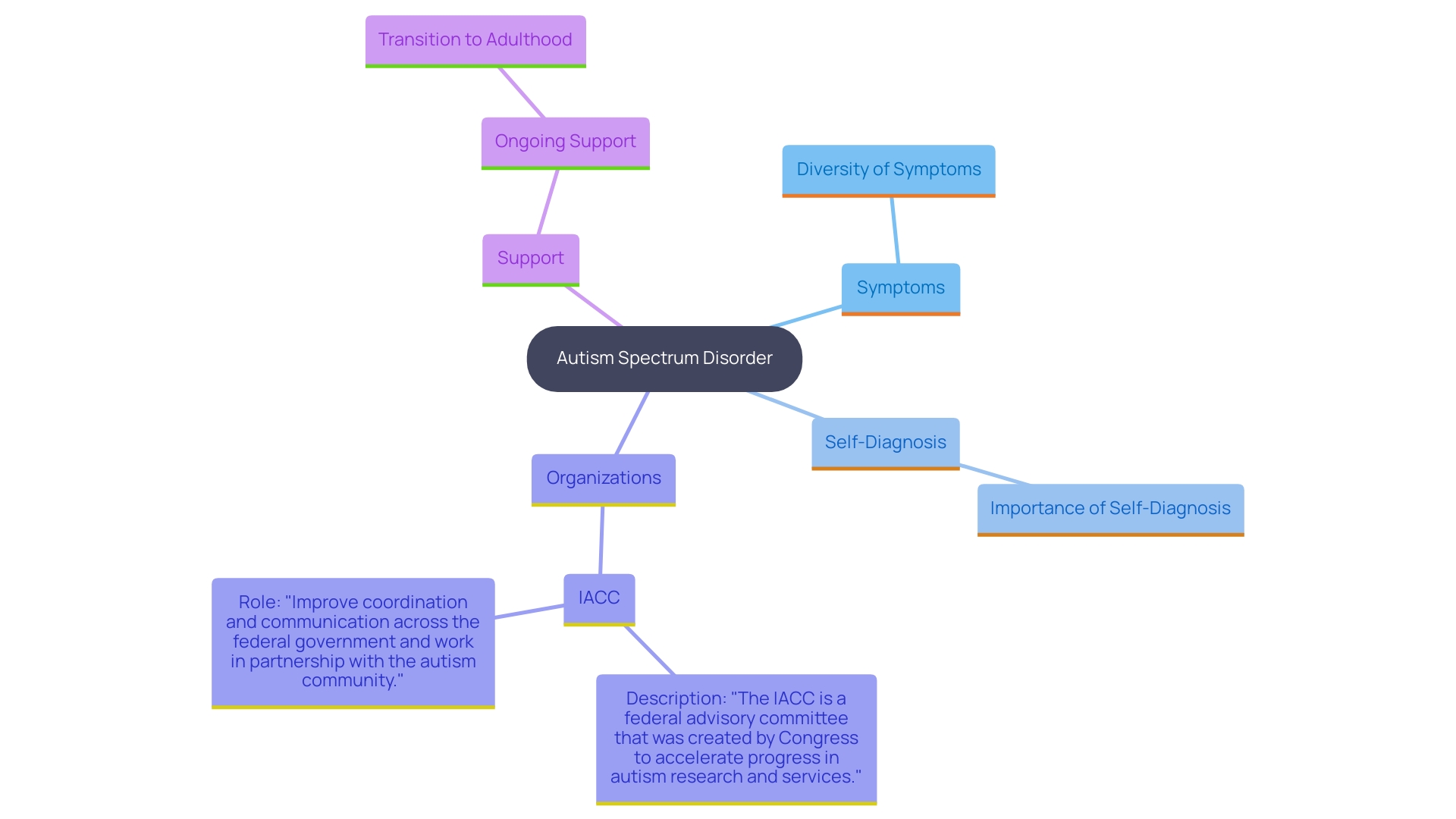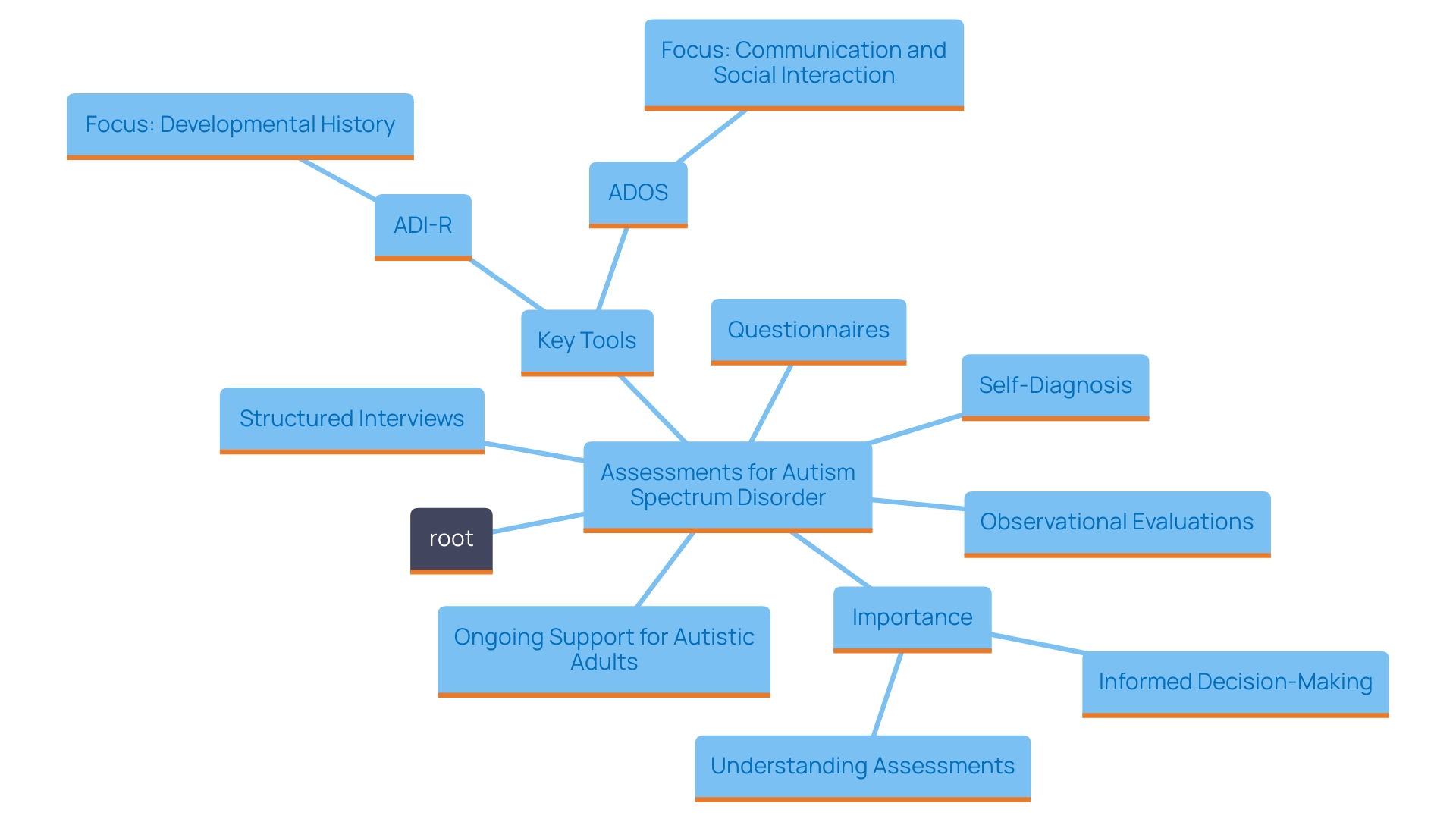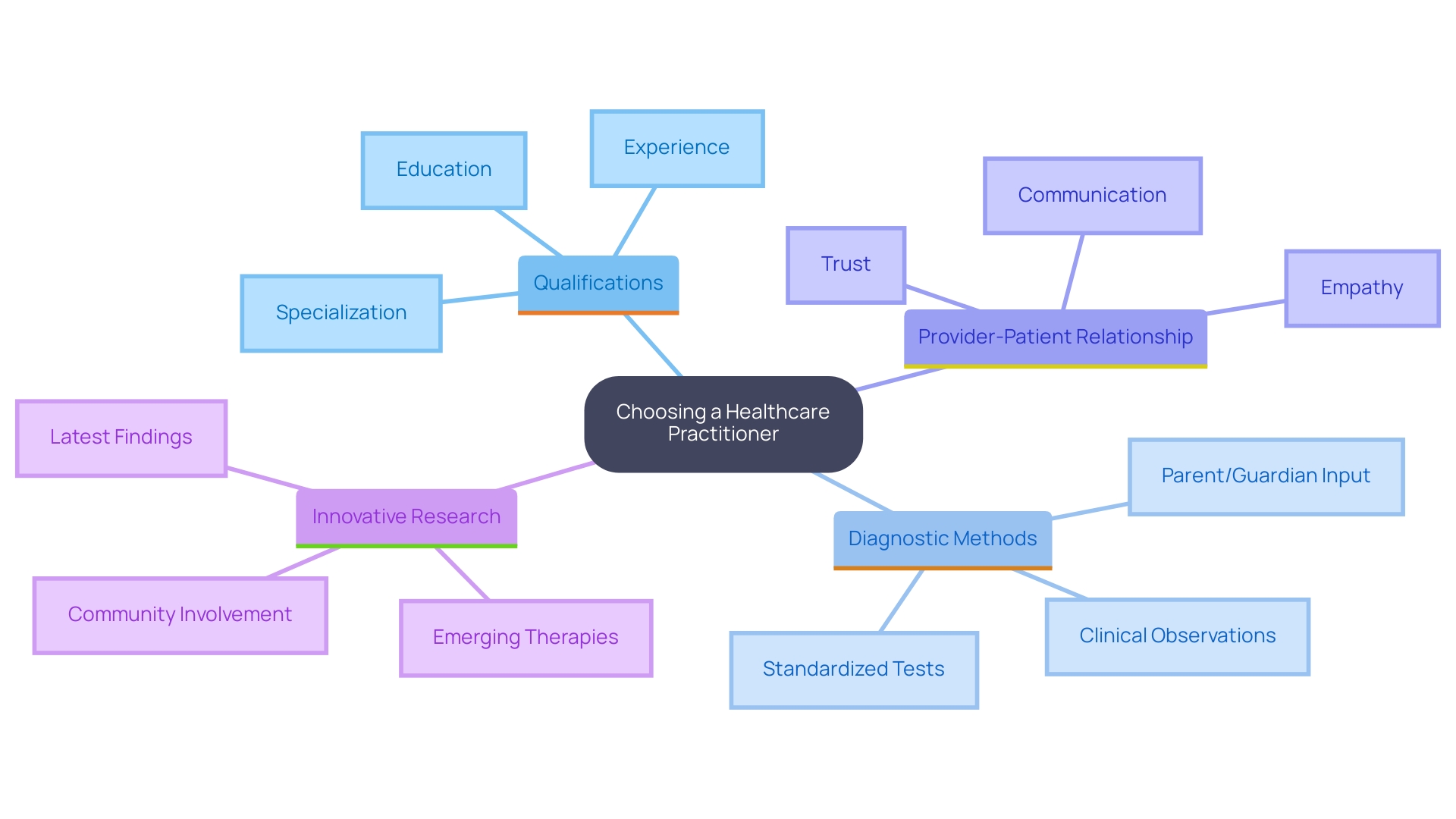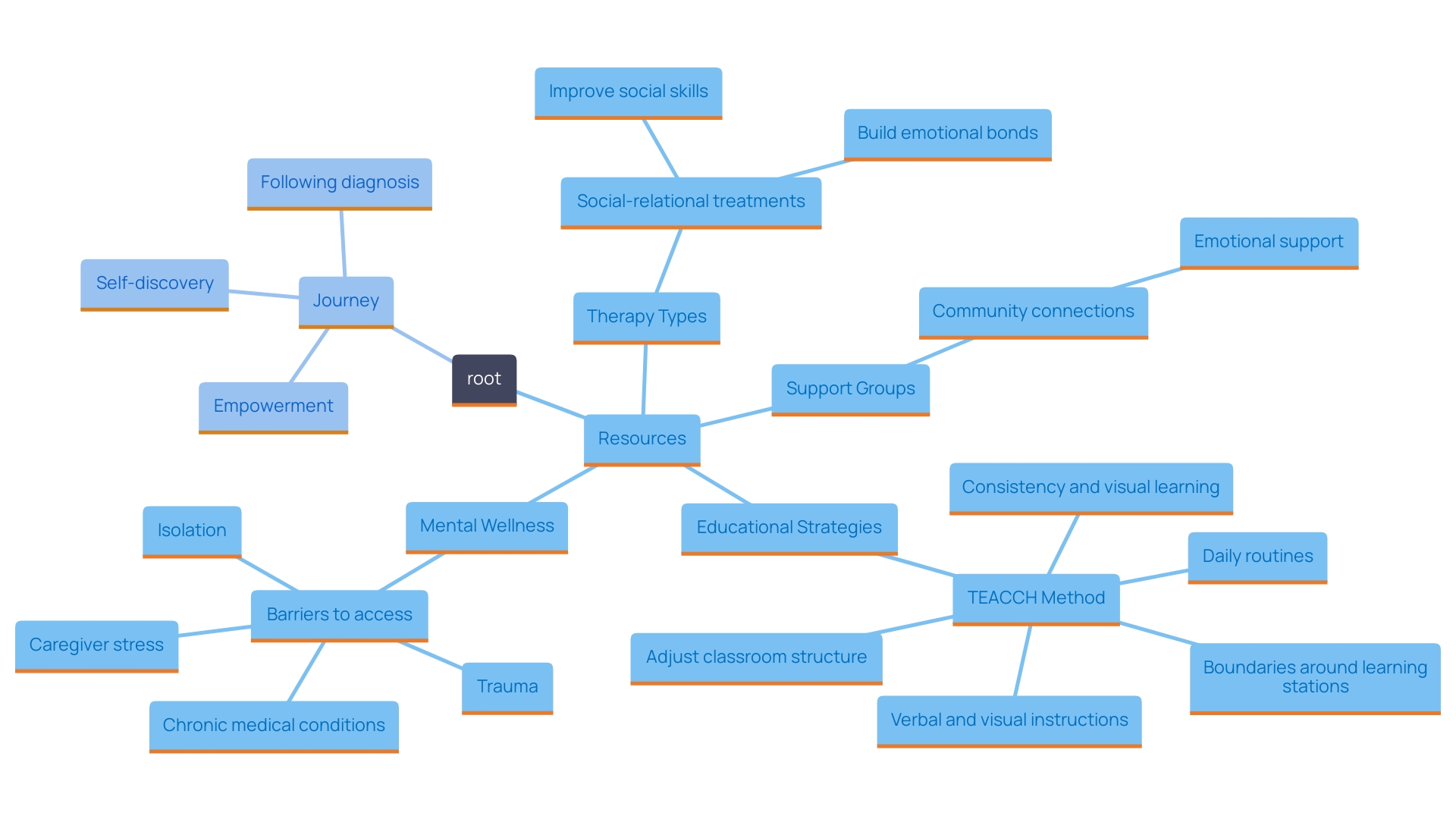Introduction
Navigating the complexities of Autism Spectrum Disorder (ASD) can be an overwhelming experience for many adults, particularly when faced with the challenges of diagnosis and support. ASD is not a one-size-fits-all condition; it manifests in diverse ways, affecting communication, behavior, and social interactions uniquely in each individual. As awareness grows, the need for tailored resources and understanding has never been more critical.
With approximately 1 in 45 adults diagnosed with autism in the U.S., many remain undiagnosed or misdiagnosed, often due to subtle symptoms that resemble other mental health conditions. This article delves into the intricacies of adult autism, providing insights into the diagnostic process, the importance of selecting qualified healthcare providers, and the essential support systems available post-diagnosis. By empowering individuals and families with knowledge and resources, the aim is to foster a more inclusive and supportive environment for all those navigating life on the spectrum.
Understanding Autism Spectrum Disorder (ASD)
Autism Spectrum Disorder (ASD) is a multifaceted developmental condition that significantly influences communication, behavior, and social interactions. It is essential to recognize that ASD presents uniquely in each individual, resulting in a vast diversity of abilities and challenges. For individuals seeking a diagnosis, comprehending this spectrum is essential; symptoms can often be subtle and may be misinterpreted as other mental health conditions.
At present, around 1 in 45 individuals in the U.S. are identified with the condition. Despite the increasing awareness surrounding this condition, many individuals remain undiagnosed or misdiagnosed, often due to a lack of understanding of their symptoms throughout their lives. "The hallmarks of autism are challenges with social communication skills and restricted and repetitive behaviors—and this remains unchanged in older individuals," highlighting the importance of recognizing these signs.
In the context of mature diagnosis, self-diagnosis is increasingly accepted within the autistic and neurodivergent community. This approach acknowledges the limitations of traditional medical assessments. Numerous individuals have reported receiving inconclusive results from formal testing, leading to the realization that an official diagnosis may not be necessary for everyone. If an official diagnosis does not change the support needed for one’s success, individuals may find it more beneficial to focus on understanding their unique experiences and challenges.
Furthermore, efforts focused on enhancing care for individuals with developmental disorders are gaining traction. The IACC, a federal advisory committee created to improve research and services for individuals on the spectrum, highlights the necessity for better collaboration between government entities and the community. As Christopher McDougle, a leading expert in neurodiverse care, states, "individuals on the spectrum may live as long as the rest of us but once they graduate high school they no longer qualify for many services or receive guidance about ongoing medical care." This statement underscores the vital need for dedicated resources and services for those on the spectrum as they transition into maturity.
Identifying the distinct manifestation of autism in grown individuals is more than an academic exercise; it is a necessary step toward accessing customized support and resources that can significantly enhance quality of life.

Types of Autism Tests and Assessments
Diagnosing Autism Spectrum Disorder (ASD) in individuals involves a variety of assessments designed to capture the complexities of the condition. These assessments typically include structured interviews, questionnaires, and observational evaluations, each serving a distinct purpose in the diagnostic process. Notably, tools such as the Autism Diagnostic Observation Schedule (ADOS) and the Autism Diagnostic Interview-Revised (ADI-R) are commonly utilized.
These evaluations focus on various aspects of behavior and communication, enabling professionals to obtain a thorough understanding of a person's unique strengths and challenges. For instance, the ADOS is particularly effective in evaluating social interaction, while the ADI-R delves into developmental history and current behavior.
Understanding the array of tests available is crucial for informed decision-making during the diagnostic journey. While some individuals may seek formal diagnoses to validate their experiences or access specific resources, it's important to acknowledge that self-diagnosis is widely accepted within the neurodivergent communities. Many individuals find that an official diagnosis may not significantly alter the support they require.
As emphasized by Christopher McDougle, MD, a prominent expert on grown-up autism, the current group of individuals with autism frequently encounters obstacles after high school, losing access to essential services. This emphasizes the need for healthcare systems to adapt and provide ongoing support tailored to autistic adults, ensuring they receive equitable access to medical care as their neurotypical counterparts do.
The urgency for effective diagnostic tools is further underscored by organizations like NeuroQure, which aim to streamline the diagnostic process, drastically reducing the time it typically takes to obtain a diagnosis. With advancements in diagnostic technology, the future holds promise for more timely interventions, ultimately enhancing the quality of life for many individuals on the spectrum.

Evaluating Healthcare Providers for Autism Testing
Choosing the appropriate healthcare practitioner for developmental disorder testing is essential for receiving a precise diagnosis. It is crucial to seek experts who focus on evaluations for grown individuals, such as psychologists and psychiatrists. These experts should possess the necessary credentials and a wealth of experience in diagnosing Autism Spectrum Disorder (ASD) in adults. Investigating their histories, examining feedback, and verifying connections with established organizations focused on developmental disorders can offer significant understanding of their qualifications.
When considering a provider, don't hesitate to inquire about their diagnostic methods and the tools they employ. As noted by Christopher McDougle, MD, a leading expert in autism at Harvard Medical School, it is vital that autistic individuals receive the same level of medical care as neurotypical people. This initiative aims to highlight the need for comprehensive care tailored to individuals on the spectrum, many of whom may fall through the cracks after high school due to a lack of available services.
Moreover, the diagnostic process itself can be flawed. Many adults face challenges when seeking formal diagnoses, often receiving inconclusive results. This emphasizes the significance of a caring provider who comprehends the distinct requirements of people on the spectrum. According to the American Psychiatric Association's DSM-5, diagnosing ASD typically requires both parents' descriptions and the professional's direct observations. Therefore, a provider who can build trust and rapport is invaluable in accurately assessing an individual.
Innovative research is underway to enhance diagnostic tools and improve accessibility to services. Technologies are being developed to assess patterns in behavior and interactions, aiming to create effective screening tools that can be integrated into routine healthcare practices. This progress reflects a commitment to bridging the gap between scientific research and practical application in clinical settings, ensuring that autistic individuals receive the quality care they deserve.

Post-Diagnosis Support and Resources
Obtaining a diagnosis of a developmental disorder can stir a complicated blend of feelings for grown individuals, offering both comfort and fresh difficulties. It marks the beginning of a journey that requires individuals to seek out tailored support resources. 'These resources may include various forms of therapy, support groups, and educational options designed specifically for individuals on the spectrum.'.
Interacting with groups that comprehend the complexities of mature individuals with developmental conditions can be extremely advantageous. Such connections not only provide emotional support but also facilitate valuable exchanges of experiences and insights. As Christopher McDougle, MD, a leading expert in autism care, emphasizes, "those on the spectrum may live as long as the rest of us, but once they finish high school, they no longer qualify for many services or receive guidance about ongoing medical care.". This initiative is a means to recognize the current population of people on the spectrum and to educate the world that they require access to quality medical care just as neurotypical persons do
This journey often involves navigating a healthcare landscape that may not fully recognize the needs of individuals on the autism spectrum. Many organizations, like the IACC, are working diligently to address these gaps by improving coordination and communication across services. Their mission is to enhance the lives of people on the spectrum and their families by providing clear pathways to necessary resources.
Furthermore, educational strategies like the TEACCH method specifically address the strengths of people on the spectrum by emphasizing consistency and visual learning. Creating structured environments helps improve academic outcomes and social skills, further supporting the personal growth of autistic adults.
It's crucial to remember that a diagnosis is just a starting point. The path ahead can lead to profound self-discovery and empowerment, enabling individuals to access the right tools for their unique journeys.

Conclusion
Navigating adult autism requires a nuanced understanding of Autism Spectrum Disorder (ASD) and its varied presentations. The complexity of the condition underscores the importance of recognizing unique symptoms that may often be misattributed to other mental health issues. With approximately 1 in 45 adults diagnosed, yet many remaining undiagnosed or misdiagnosed, the need for awareness and tailored resources is paramount.
Self-diagnosis has emerged as a valuable avenue for many, enabling individuals to focus on their experiences without the constraints of formal diagnoses.
The diagnostic process itself is multifaceted, involving a range of assessments that address the diverse dimensions of behavior and communication. While traditional tools like the ADOS and ADI-R are essential, the growing acceptance of self-diagnosis highlights the need for flexibility in how autism is understood and diagnosed. The call for improved healthcare systems that cater to the ongoing needs of autistic adults is echoed by experts, emphasizing that access to quality care should be equitable for all.
Post-diagnosis, the journey continues with the exploration of support and resources tailored to individual needs. Engaging with supportive communities and accessing specialized therapies can significantly enhance quality of life. Initiatives aimed at bridging gaps in care and promoting effective educational methods further empower autistic adults to thrive.
Ultimately, a diagnosis is just the beginning. It opens the door to self-discovery, advocacy, and the pursuit of meaningful support, fostering a more inclusive and understanding society for those on the autism spectrum.




